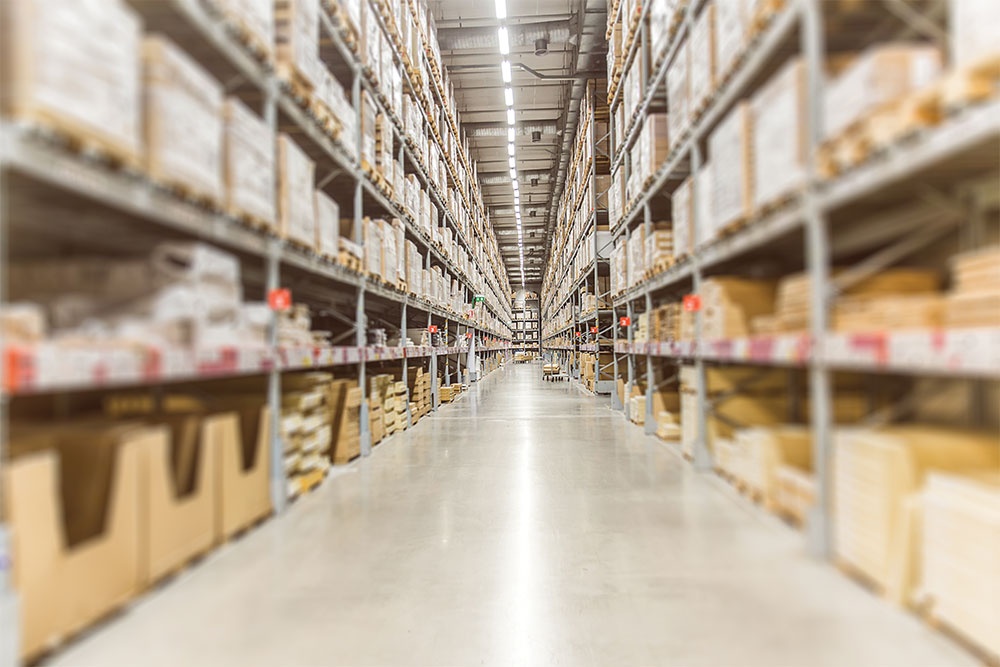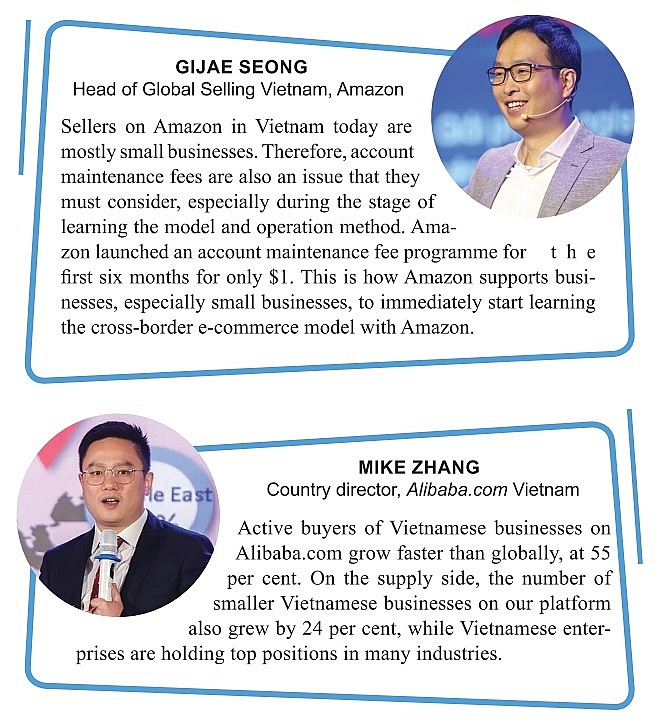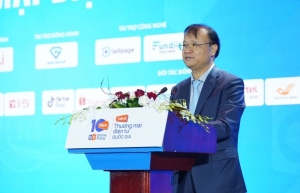E-commerce’s bumper plans for 2024
From a small business specialising in unique handicraft products, Indochina JSC has made an unexpected transformation since joining Alibaba.com.
 |
| More Vietnamese businesses are able to take advantage of the vast resources wielded by the likes of Amazon and Alibaba, Photo: Shutterstock |
Indochina director Hoang Thanh Tam said that the company made its first export order after only a month of doing business on the platform. Two years later, Indochina signed its first large order with two containers of fine art products exported to the Arab market.
Today, Indochina has served more than 3,000 customers from countries such as the United States, Canada, Denmark, Japan, and South Korea.
“We joined Alibaba in 2015 with two accounts. One account is used to introduce consumer goods and décor products to the US and European markets, and the other account is to promote products for the Arab and Asian markets,” Tam shared.
Favourable business has helped Indochina grow rapidly in both profit and scale. After eight years, the company’s number of employees has increased from three people to nearly 1,000.
“The company’s reputation has quickly improved since being upgraded to Verified Supplier on Alibaba in 2021. The amount of interaction on the two accounts has increased by more than half, and the number of successfully signed orders has also increased by around one-third,” Tam said.
Like Indochina, Vietnamese cosmetics brand Abera has had the opportunity to reach the international market and become a success story for Vietnamese startups on Amazon.
Founded in 2020, Abera first launched on Amazon at the end of 2022. According to Abera sales manager Dong Thanh Son, in that time the company has achieved millions of dollars in revenue, and an order conversion rate five times higher than the domestic market. The number of orders reached 15,000.
“This is a big victory for the Vietnamese cosmetics sector and until now, only Abera has been able to do this,” Son shared.
In Vietnam, many small- and medium-sized enterprises are looking for opportunities to expand their business on e-commerce platforms as a solution to boost revenue in the context of an economic recession that is making traditional business activities difficult.
In addition to Amazon and Alibaba, other international e-commerce platforms such as Shopee, Lazada or TikTok are also very popular. The competition between platforms, from Amazon and Alibaba to Shopee, Lazada, and TikTok, has increased as each side tries to offer its own incentives to attract more partners and increase influence in the market.
Controlling the game
According to data from the Ministry of Industry and Trade, e-commerce continues to be one of the bright spots in Vietnam’s digital economic development, with an average growth rate of over 20 per cent annually.
In 2023, Vietnamese e-commerce is expected to achieve a growth rate of 25 per cent with expected online revenue of about $20.5 billion, 5 per cent higher than last year.
Attractive growth rates, increased demand for online shopping, and incentive policies from management agencies have created an attractive e-commerce playground and plenty of room for expansion in Vietnam.
Le Hoang Oanh, director of the E-Commerce and Digital Economy under the Ministry of Industry and Trade (MoIT), emphasised that promoting e-commerce is an important goal in digital economic development.
The ministry is collaborating with these international e-commerce platforms to deploy in-depth human resource training and consulting programmes.
“On average, each year, about 50 training classes are organised, training 10,000 people on how to distribute goods on e-commerce platforms. It is expected that in the next five years, we will train one million people from businesses in digital and e-commerce-related skills, in addition to building codes of conduct for the online business environment,” Oanh said.
Mike Zhang, country director of Alibaba Vietnam, said that it is cooperating with the MoIT to deploy the Vietnam National Pavilion programme on the platform. Around 100 businesses carefully selected from the end of November to January 15 will participate in the pavilion and receive support from Alibaba to promote their products to more than 260 million shoppers in 190 countries and territories where Alibaba is present.
“Selected partners are required to meet a number of requirements, including having reputable and quality Vietnamese-made products, and using business-to-business e-commerce tools continuously and effectively, with priority given to businesses that have export potential,” Zhang said.
“This is a special event that introduces unique Vietnamese branded products and provides a strategic platform for domestic businesses to connect with global customers,” added Zhang.
Last year, Alibaba launched more than 20 free training courses in 20 localities. Businesses that meet the criteria will be able to participate on its platform after the course ends.
 |
High awareness
Similarly, Amazon.com in recent times has focused on building its Amazon Day-1 Vietnam Training Centre and a new office in Ho Chi Minh City. Its first onsite training and networking centre in Vietnam can accommodate 100 people, and boasts a livestream studio to produce and broadcast online educational content and webinars.
In addition, Amazon has also launched a range of new tools and programmes including fee waivers, brand-tailored promotions, and more besides.
“Vietnamese businesses are increasingly interested in cross-border e-commerce. Our biggest goal in previous years was to raise awareness of businesses about this model and opportunity. But in recent years, Vietnamese businesses have had a higher awareness of cross-border e-commerce,” said Gijae Seong, head of Global Selling in Vietnam for Amazon.
According to data from Amazon, 17 million products from Vietnamese businesses have been sold to Amazon customers worldwide. Over the previous 12 months ending in September 2023, the number of Vietnamese selling partners increased by 40 per cent and the export value of Vietnamese businesses selling with Amazon increased by 50 per cent.
The categories of Vietnamese products with the best sales on Amazon are home decorations, furniture, and beauty items.
According to a report by Google, Temasek and Bain & Company in November, Vietnam has maintained its status as the fastest-growing digital economy in Southeast Asia for two consecutive years and is forecast to retain this position into 2025. The report estimates that the total value of Vietnam’s gross merchandise value is anticipated to rise to nearly $45 billion in 2025, with the e-commerce sector driving this growth.
According to statistics from Lazada, 43 per cent of customers who access its app to search for and purchase products online every day are Gen-Z customers.
“Young users are increasingly more demanding, tend to look for higher-quality and more reliable products, and will change brands if quality is not guaranteed,” said deputy general director of Lazada in Vietnam, Dang Anh Dung.
He said that e-commerce is offering consumers more choice in products and services. “But to retain them, sellers need to bring a more diverse and engaging experience that includes adding value to products and providing sustainable services. This depends on the strict policies for partners of each platform,” Dung added.
 | Online exports excite e-commerce players Many businesses are implementing strategies to access international markets through product promotion and consumption on e-commerce platforms to exploit the fertile potential of online exports. |
 | Vietnam in global top 10 for e-commerce growth E-commerce in Vietnam has recorded outstanding growth of 16-30 per cent per year over the last ten years, with the market size expected to reach $20.5 billion in 2023. |
What the stars mean:
★ Poor ★ ★ Promising ★★★ Good ★★★★ Very good ★★★★★ Exceptional
 Tag:
Tag:
Related Contents
Latest News
More News
- A golden time to shine within ASEAN (February 19, 2026 | 20:22)
- Vietnam’s pivotal year for advancing sustainability (February 19, 2026 | 08:44)
- Strengthening the core role of industry and trade (February 19, 2026 | 08:35)
- Future orientations for healthcare improvements (February 19, 2026 | 08:29)
- Infrastructure orientations suitable for a new chapter (February 19, 2026 | 08:15)
- Innovation breakthroughs that can elevate the nation (February 19, 2026 | 08:08)
- ABB Robotics hosts SOMA Value Provider Conference in Vietnam (February 19, 2026 | 08:00)
- Entire financial sector steps firmly into a new spring (February 17, 2026 | 13:40)
- Digital security fundamental for better and faster decision-making (February 13, 2026 | 10:50)
- Aircraft makers urge out-the-box thinking (February 13, 2026 | 10:39)















 Mobile Version
Mobile Version